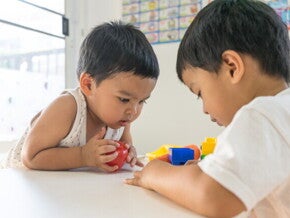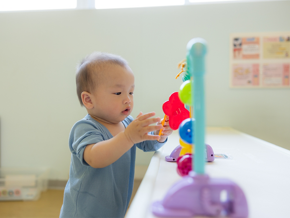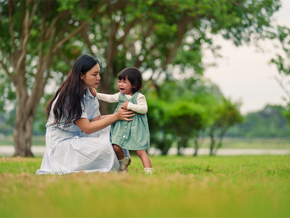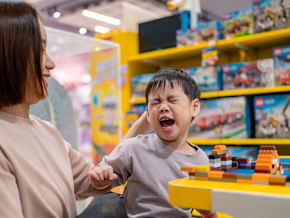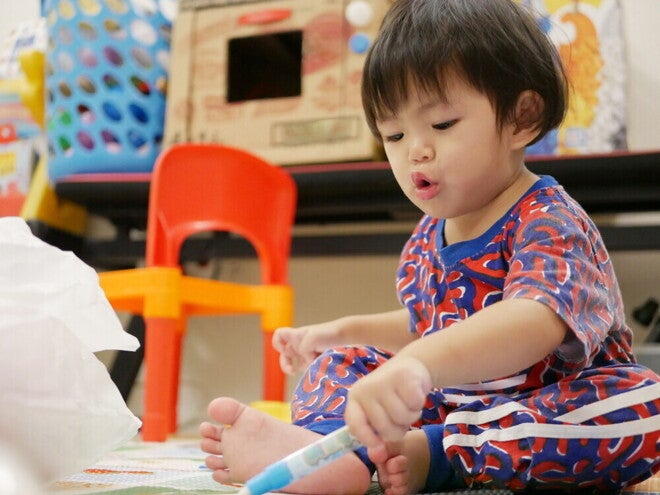
Doodling and Talking? Here Are Your 18-Month-Old Baby's Milestones
Your 18-month-old baby is no longer just your little one who stays in one place. These days, they're probably running, babbling, and testing what they can do on their own. It's both exciting (and tiring for you!) to see how they now move, play, and express themselves.
Let's look at the milestones you can expect around this age and how you can support your child's growth through play, sleep, and daily routines. (Your baby is 24 months old? Check out this 2-year-old baby milestone guide!)
Weight and Height at 18 Months
Your 18-month-old baby's weight and height are signs of how healthy and hiyang your child is. While growth slows down at this age compared to infancy, you should still see steady progress.
You can enter your child's latest measurements from the pediatrician's clinic on ParenTeam's growth chart calculator. It uses the World Health Organization's (WHO) length/height-for-age standards.
Here are your 18-month-old's weight and height based on the WHO growth chart.
- An 18-month-old baby girl may weigh around 10.25 kg (22.6 lbs) on average, with a height of 82 cm (32 in).
- An 18-month-old baby boy's average weight is 11 kg (24.1 lbs) with a height of 82.4 cm (32.4 in).
Keep in mind that your pediatrician is looking at your child's overall growth trend over time, not a number on the chart. Your doctor is also not just looking at height and weight in regard to your child's development.
18-Month-Old Developmental Milestones

Developmental milestones can help you understand what your toddler is expected to do at this stage. The checklists below are based on guidance in the developmental surveillance tools published in Pediatrics by the American Academy of Pediatrics (AAP) in collaboration with the Centers for Disease Control and Prevention (CDC).
Motor milestones
Your 18-month-old baby is seemingly in constant motion. These motor skills reflect their growing coordination, strength, and confidence.
- Your toddler can now walk without holding onto you or any support.
- They will scribble.
- They can drink from a cup without a lid (expect spills, of course!).
- Your 18-month-old can now feed themselves with their fingers.
- They will try to use a spoon.
- They can climb on and off a couch or chair without help.
How to develop motor skills: Engaging in physical activity at this stage helps strengthen muscles and improve balance. Try simple games like stacking soft blocks or running around in open space.
Cognitive milestones
At this age, your child’s curiosity is in full swing. You’ll notice how your 18-month-old starts to think and act with purpose.
- Your child now copies you doing chores, like when you vacuum the carpet.
- They're learning how to play with toys, such as pushing a toy car.
How to support cognitive milestones: Simple routines and pretend play nurture your child’s understanding of how things work and help build focus. Here's a list of brain games to make part of your 18-month-old baby's activities.
Language and communication milestones
This stage is when your toddler's words begin to form, and they will try their best to express themselves using gestures if they can't articulate the words.
- Your toddler may now say at least three words besides "mama" or "dada."
- They follow one-step directions without any gestures. For example, they'll hand you the toy when you say, "Give it to mama."
How to boost language and communication: If your 18-month-old baby is not talking much yet, keep chatting, reading, and naming objects during play.
Social-emotional milestones
Your 18-month-old baby is becoming more independent but still looks to you for comfort and reassurance.
- Your child may move away from you, but they look to make sure you are close by.
- They point to show you something interesting.
- They put their hands out for you to wash them.
- Your 18-month-old baby looks at a few pages in a book with you.
- They assist with dressing by pushing an arm through a sleeve or lifting a foot.
How to encourage social-emotional growth: Play games like peekaboo or sing-alongs to help your child connect with others and express emotions.
Sleep at 18 Months Old

Sleep gives your toddler’s growing body and brain the downtime they need to recover and process everything they’ve learned.
AAP and the American Academy of Sleep Medicine state that toddlers ideally need 11 to 14 hours a day of sleep, usually split between a long stretch at night and one daytime nap.
Some toddlers may experience sleep regression, a period when they struggle to sleep well or through the night, despite having established sleep routines. According to the Sleep Foundation, sleep regression may coincide with developmental changes.
Toddlers at 18 months are moving around more, wanting to do things on their own, and may find themselves dealing with separation anxiety. These situations can make it tough for them to settle down at night or take naps during the day.
The good news is that sleep regressions are temporary. Consistency and patience are key to helping your 18-month-old baby get the rest they need.
Here are a few things that can help maintain healthy sleep habits:
- Keep a consistent bedtime routine (like bath, story, and lights out).
- Avoid overtiredness by watching for sleepy cues.
- Offer comfort but stay firm about bedtime limits.
- Make sure your toddler gets enough physical play during the day.
Enjoy the Ride!
Your toddler is growing more confident, curious, and expressive every day. You'll notice new skills appearing almost overnight, from taking more steps on their own to trying out new words. These milestones show how your child’s body and brain are working together to learn and adapt.
Watching your 18-month-old baby grow can feel like seeing something new every day, right? But remember, every child develops differently. Regular well-child visits with your pediatrician help you track your child’s unique pace and address any concerns early.
What is the latest milestone your 18-month-old baby has reached? Celebrate the moment on ParenTeam's Moms and Dads Facebook group!

















